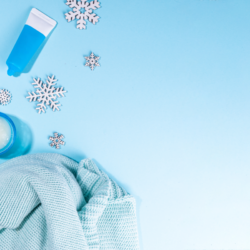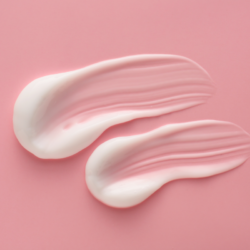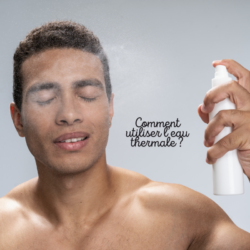Does your skin start to redden, sting, burn or itch just by looking in the mirror? At least that’s what it feels like when you have sensitive skin. Today we are going to take a closer look at atopic skin.
What is sensitive skin?
Sensitive skin is a common problem, but is not a medical diagnosis in itself. The term generally refers to skin that is more prone to inflammation than so-called “normal” skin. However, the cause of the inflammation may be different for each person. People with generally sensitive skin have reactions to chemicals, dyes and fragrances in products that come into contact with their skin. They may also experience rashes or irritation from clothing or rubbing. Some people are allergic to certain substances and may have reactions on their skin. Let’s take a look at how to relieve this reactive skin!
Going the extra mile with sensitive skin:
People with sensitive skin are often desperate not to be able to use the same products as everyone else. They buy a lot of creams, but cannot apply them to their sensitive skin without experiencing discomfort. This is why it is important to ask whether there is a problem of contact sensitivity to a specific ingredient. It is worth sending these people for patch tests (a method used in dermatology to determine whether a specific substance is capable of causing an inflammatory reaction in the skin), in which we examine in detail the behaviour of their skin after exposure to common allergens. Not forgetting substances such as perfumes and preservatives, which are often responsible in this situation.
What causes skin hypersensitivity?
Hormonal disturbances, illness, stress, anxiety and fatigue: All these intrinsic factors play a role in triggering epidermal hyperreactivity. It must also be said that many extrinsic sources can cause sensitive skin. For example, the sun, wind, cold or sudden changes in temperature. In fact, in many cases, the main problem is the breakdown of the skin’s hydrolipid barrier. When the skin’s protective film is compromised, the stratum corneum, the outermost layer of the epidermis, no longer does its job. Usually its job is to keep all the bad stuff out. This means that with the continued use of unsuitable products, ingredients have the ability to penetrate the skin and can stimulate immune reactivity. Until this triggers the release of inflammatory mediators from our nerve endings: this is the activation of the inflammatory cascade. So that’s the simple thought process I go through when I look at someone who complains about having sensitive skin.
How can I help my sensitive skin get better?
-
Eating well
The idea that you are what you eat is not always true, but eating well can help strengthen the skin barrier. Eating for skin health and hydration has far more impact than drinking water. If your skin lacks moisture, drinking water is not the answer. The right foods can help rebuild and strengthen your lipid bilayer, which helps keep the stratum corneum intact. Drinking water to moisturise when the skin barrier is damaged is like pouring water into a sieve: you have to plug the holes before you pour the liquid in. Good fats from nuts, avocados and oily fish are ideal. You can also supplement them with fish oil or flaxseed, which are rich in omega 3. There are many food supplements that can help you in your quest for skin “wellness”!
-
Adjust your cleansing routine for sensitive skin
Taking care of sensitive skin starts with clean skin. However, an aggressive cleanser can make it more fragile. Excessive cleansing and exfoliation are the most common ways to damage the skin barrier, as the protective outer layer is damaged: even water alone can irritate it.
Start by questioning your choices in facial cleansers:
1.Do you use a foaming cleanser or a double cleanser? 2.How does your skin feel after cleansing? 3.Do you prefer a gel or cream texture? It is important to choose a gentle, fragrance-free cleanser!
-
Fill up on barrier repairing ingredients
In the case of sensitive skin, certain ingredients can help support, restore and strengthen the skin barrier. It is therefore essential to include them regularly in your routine. Ceramides are essential to skin health. They hold the skin together and form a protective layer. This prevents moisture loss and visible damage from environmental stressors. They can be used day and night and are suitable for all skin types. In fact, even people with oily skin can use them, as they do not weigh down a product formulation. Niacinamide or vitamin B3 helps to strengthen your barrier as it increases the natural production of ceramides. It is a fantastic all-rounder that is very well tolerated, so most people can use it. It is also safe to use during pregnancy and breastfeeding. However, it is important to look for formulas with a low concentration of niacinamide. The topical application of essential fatty acids is also essential for the proper functioning of the skin barrier. In this respect they act mainly as Swiss Army knives, repairing the skin barrier, while nourishing and softening the texture of dry skin.
-
Replace humectants with occlusives
The humectant components commonly used in cosmetics, such as glycerine and hyaluronic acid, attract and retain moisture in the skin. Unfortunately, however, they cannot heal the skin barrier on their own. When the temperature drops, for example, the use of occlusive ingredients will help create a protective seal on the skin. In fact, it will prevent transepidermal water loss. Look for ingredients such as squalane, mineral oil, shea butter or dimethicone that are much more effective at retaining moisture during the colder months.
Sources:
- https://pubmed.ncbi.nlm.nih.gov/23254724/
- https://pubmed.ncbi.nlm.nih.gov/24993939/
- https://pubmed.ncbi.nlm.nih.gov/22928591/





